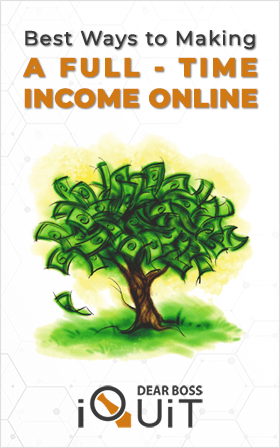A survey conducted by Harris Poll on behalf of Fast Company revealed that in 2021, 52% of U.S. workers were after transitioning to a new career.
Since you’re here, I’m guessing you aspire to shift to a new career path too.
Maybe you’d like to pursue a higher-paying profession. Maybe you’ve grown bored of your current job and long for earning your living by doing something you’re more passionate about. Or maybe, you want to improve your work-life balance by doing a job that offers a flexible schedule and the ability to work remotely.
Whatever the case, I know for a fact that career transitions involve more fear, friction, disruption, risk, and uncertainty than simply staying in your current, familiar career, especially if you have zero clue how to go about it.
The good news is that I’m here to help you out by sharing with you ten simple steps that’ll make your career change as smooth and painless as possible.
Let’s take a closer look.
1. Discover what you want
Before ditching your current career, it’s important that you take time to self-reflect, do some research, and figure out exactly what career path you’d like to pursue.
Once you’ve zeroed in on the field you’d like to switch to, take stock of the potential job titles within it, their descriptions, their day-to-day responsibilities, and the necessary skills, education, and experience you’ll need to acquire to get hired to such positions.
2. Make a plan
After you’ve gathered enough feedback regarding your career of interest, you’ll need to start planning your transition.
First, figure out the exact steps you’ll have to take to get from where you are to where you want to be.
This might include going back to school, attaining certifications, serving internships, building a portfolio, improving your resume, sharpening your interviewing skills, networking with professionals in your desired industry, etc.
Then, create a plan that would enable you to start implementing those steps during your time off work.
3. Be patient
Shifting to another career takes time and effort.
However, try not to get discouraged if you’re unable to make progress as quickly as you initially expected.
Maintaining patience without getting overly discouraged throughout the process is crucial to achieving your career goals.
4. Seek out help
Changing careers is no walk in the park.
If you ever feel lost or stuck, there’s no shame in seeking out help.
First, you could turn to friends and family members for tips, advice, and feedback.
Moreover, hiring a career coach to point you in the right direction, help you stay on track, and guide you through your career shift could go a long way.
5. Have faith in yourself
Believing in yourself is key to pulling off anything in life, including a successful career transition.
Many studies have shown that self-efficacy, or your ability to believe in yourself, indicates success in many aspects of one’s life from academic performance to giving up bad habits like smoking.
Believe in yourself and your infinite potential. Your only limitations are those you set upon yourself.
-Roy T. Bennett
6. Stay positive
Making a career transition can be quite stressful and frustrating.
Maintaining a positive attitude throughout the process could significantly decrease your chances of failing.
Always keep in mind that there’s nothing impossible for the person who’s willing to give it a shot.
The only failure is not trying
-George Clooney
7. Be adaptable
Most of the time, the process of pivoting to a new career is messy and unpredictable, regardless of how well you might have planned it out.
For example, attaining the required skills to qualify for a job in your desired industry could take longer than expected. Or maybe, networking might prove to be much more demanding than you initially thought.
Or, you might have to take a step back to focus on a personal obligation because life just got in your way (it does that sometimes).
Encountering setbacks while pursuing any kind of positive transformation is inevitable.
Being adaptable enough to tackle such unexpected occurrences is what separates those who reach their goals from those who don’t.
Never let a setback derail your entire plan – instead, leverage it as an opportunity for learning and growing.
According to management science experts, the five most common challenges people face while making a career transition are:
- Ageism
- Lack of experience
- Taking pay cuts
- Learning curve
- Employment Gaps
Let’s take a more in-depth look.
1. Ageism
One of the biggest challenges you might face when pivoting to a new career is ageism. Unfortunately, nowadays, many companies avoid hiring workers who have surpassed a certain age. As such, if you’re kinda older, you might have difficulty landing a job in your desired industry.
The best way to overcome ageism is to address it head-on. Explain why your age is an asset, not a liability as early as possible during the hiring process, i.e., in your cover letter or during the interview.
2. Lack of experience
Lack of experience is yet another pretty common setback. Since you’ll be shifting to a new career, chances are that you won’t possess the required work experience to get hired for the positions that interest you.
If that’s the case, try to highlight any relevant experience you do have that could be of use in the field you’re transitioning into. For example, if you’re applying for a sales position, you could emphasize your customer service experience.
3. Pay cut
Taking a pay cut is the norm when it comes to changing jobs or careers. That’s because most of the time, you’ll have to work your way up from the bottom of the ladder.
Prepare yourself for accepting lower-paying, entry-level positions in exchange for acquiring experience that could help you land higher-paying jobs in the future.
4. Learning curve
Breaking into a new career path involves an enormous learning curve. You’ll need to learn new skills, acquire fresh knowledge, adopt new procedures, socialize with new people, adjust to an unfamiliar environment, etc. Adapting to all this can be pretty overwhelming.
Thankfully, there are tons of resources you could leverage towards shortening and streamlining your learning curve, such as:
- online courses
- blogs
- vlogs
- podcasts
- books
- etc.
5. Employment gaps
Last, but not least, if you left your initial career a while before being ready to transition to your desired one, new employers might be reluctant to hire you due to your employment gap.
In such a case, always be prepared to explain the reasons for your unemployment. The best way to do that is by telling the truth.
Just let the interviewer know that you’re currently in the process of transitioning careers and that your employment gap was actually leveraged toward taking some time off to decompress and lay the groundwork for vigorously stepping into the new career.
Conclusion
Making a career transition is challenging and uncomfortable.
However, what’s even worse is staying in a career you’re not satisfied with.
The average person will spend 90,000 hours at work over a lifetime.
If the idea of wasting such a massive amount of time working a job that makes you miserable sounds appalling, you need to start taking action toward making a positive change in your professional life.
Hopefully, the tips I shared with you in this article helped you get a more solid grasp of how to approach your career transition and achieve your career goals better and faster.
If you have any questions or require further help, leave a comment right below or contact me right here, and I’ll do my best to get back to you as soon as possible.
Best of luck in all your endeavors.
Harry, Founder & Creative Director at dearboss-iquit.com


